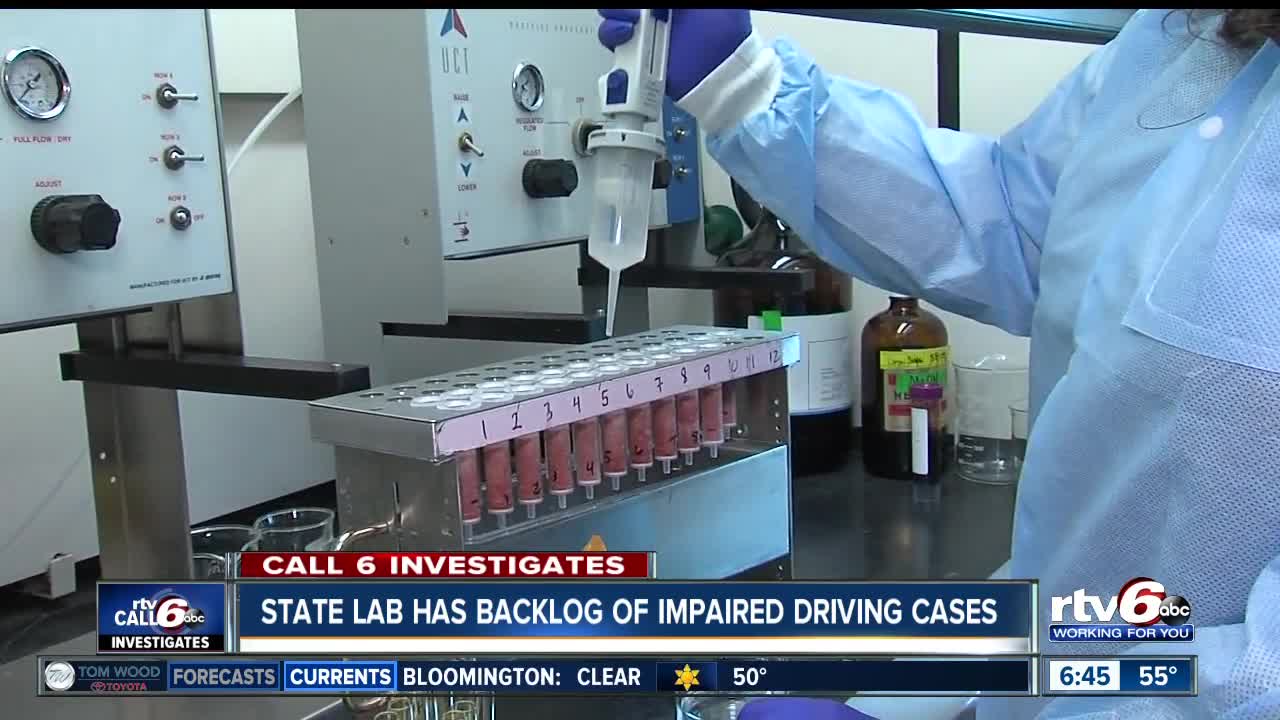INDIANAPOLIS — Call 6 Investigates has uncovered the Indiana State Department of Toxicology is struggling to keep up with the growing number of impaired driver cases in Indiana.
As police departments become more adept at recognizing drugged drivers, more law enforcement agencies are making arrests and pulling blood samples from impaired driving suspects.
When a driver is arrested for drunk or impaired driving, a nurse takes their blood.
Most of the blood samples end up at the Indiana State Department of Toxicology forensic lab where scientists test them for drugs and alcohol.
They have a backlog of 6,000 cases, almost all of which are drug and alcohol OWI related.
Since the lab opened in 2012, the Indiana State Department of Toxicology has seen a 94% increase in case submissions, according to director Ed Littlejohn.
Littlejohn said police, prosecutors and coroners are becoming more aware of the lab.
Plus, police departments are using more drug recognition experts to better detect when a driver is on drugs even if they pass a breathalyzer.
RELATED | Drugged Driving a growing problem on Central Indiana roads
Littlejohn said the backlog also happened because they took time to improve their screening methods.
“Our scientists developed a method so that we could go to one instrument to screen for all the drugs, and that takes time,” said Littlejohn.
Of the blood that tests positive for drugs, 60% are positive for THC or marijuana, according to the 2018 annual report.
“Of the cases that screened positive, 35.2% were positive for opioids (with 11.4% being positive for Fentanyl), 33.4% were positive for benzodiazepines/z-drugs; 38.9% were positive for stimulants; 1.5% were positive for muscle relaxants, and less than 1% were positive for barbiturates,” read the 2018 report for the Indiana State Department of Toxicology.
The lab has 9 scientists to process thousands of impaired driving cases.
“Our staffing is something we are building upon,” said Littlejohn.
Currently, the oldest case awaiting testing is 10 months old.
That means police and prosecutors may have to wait almost a year to get results back, which can impact victims and defendants who are waiting for criminal cases to get resolved.
RELATED | Father pushes for tougher drugged driving penalties after wife's death
Littlejohn said they can prioritize cases if need be such as in a fatal crash, or any case involving children or the elderly.
“It’s a lot of work,” said Littlejohn. “Our plan is by the end of the year to have our turnaround time down to 4-5 months, basically cutting it in half through the year.”
The new state budget, just signed by Governor Eric Holcomb, adds a 10th scientist to the lab as of July 1.
Littlejohn says the additional scientist will help reduce the backlog.
Some police departments still use private labs and hospitals to do their blood analyses.
The State Department of Toxicology is working to get national accreditation to add even more credence to their test results.
"If we get a sample, it is accurately tested and the results- we will stand behind every time," said Littlejohn.
Workers at the state lab do not take it for granted that public safety is on the line, and their results help keep drugged and drunk drivers off the road.
"The stress involved in forensics is always present because of that,” said Littlejohn. “We try to keep the stress of the scientists. I want quality lab work and management handles the stress."






